Former college football coach and ESPN announcer Mike Gottfried has found a new arena, helping to plug up the heart hole for thousands of fatherless young men
By Al Blanton
In 1989, the phone rang at the Pitt football office. A young Pittsburgher was inquiring about a job, and the secretary put him through to Head Coach Mike Gottfried. After a few minutes into a gauzy, unremarkable pitch, the aspiring coach said something Gottfried would never forget.
“What are you doing now, son?” Gottfried asked.
“Well, right now, I’m working on the Pennsylvania Turnpike.”
“I wish I could help you, but we don’t have a job right now,” Gottfried said. “But…send me your resume and we’ll keep it on file.”
The next day when Gottfried arrived at the office, his secretary informed him that the same young man was waiting for him.
A bit frustrated at the prospective candidate’s ability to follow instructions, Gottfried told him, “I said send your resume, not bring it by.”
But the young man’s persistence made such an impression on the coach that when a coaching position later came open at Pitt, Gottfried hired him.
That man’s name is Mike McCarthy, head football coach for the Green Bay Packers*.
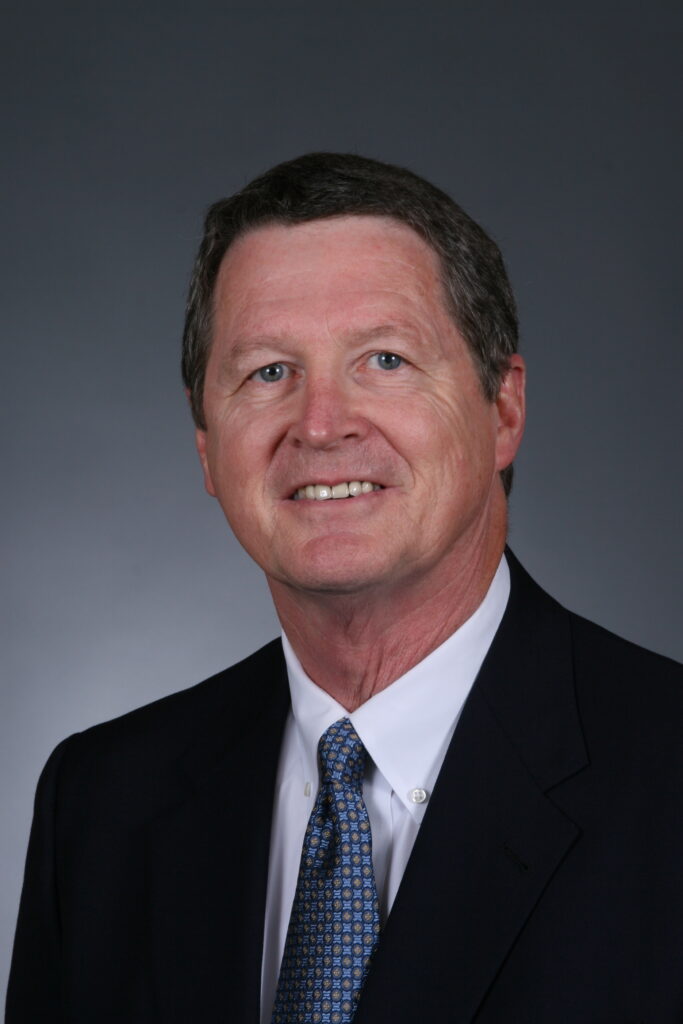
Almost thirty years later, Mike Gottfried sits in his war room at the Team Focus office in Mobile, Alabama, answering an array of cell phone calls and meeting with glowing staffers who pepper him with varying requests. Though his trademarked, Caesar-like hair is graying and his speech is compromised from what one doctor believed was mild stroke, it seems as though nothing can slow the 71-year-old down. He dresses for a workout. Today, he’s wrestled into a lime Under Armor pullover, gym pants, and black, thick-soled tennis shoes. He shuffles around the office like a bee visiting garden flowers—pulling T-shirts, books, and pamphlets out of boxes and tossing them to guests. Extra large? Large? Behind him, the Team Focus game plan is inscribed in red EXPO marker on two massive whiteboards the size of a Mazda. Four deflated, half-white footballs, still in their plastic bags, sit on a long table like fish in a live well, and there are cardboard boxes with unnamed contents choking the ceiling.
A self-described “connector,” Mike invests much of his day introducing people, stuffing a cell phone into various ears and saying, “here, talk to this person.” Mike casts a wide net of influence and his interests are far ranging, from boys who need a father figure to a budding project for Israel. Southern life has yet to blot out his native Ohioan dialect, which rises to a euphoric, kidlike falsetto at punch lines of stories.
Team Focus is the culmination of Mike’s lifelong struggle to heal from the untimely death of his father; it’s his “More Than Conquerors” effort strung together in a long, continuous vigil. The goal of the organization is to provide a comprehensive mentoring program for young boys, ages 10-18, who find themselves in unfortunate circumstances with no father present in their life. The tagline is “Guiding Young Men to the Ultimate Victory” and the labor is unashamedly Christian, centering on Jeremiah 29:11: “For I know the plans I have for you,” declares the Lord. “Plans to prosper you and not to harm you, plans to give you hope and a future.”
For Mike, the crucible began on April 3, 1956.
Fritz Gottfried was a railroad engineer in the small Midwest town of Crestline, Ohio. An old photograph displays a man with deep-set eyes and tight coils of brown hair lapping against the top of his forehead. His wife and three sons squint at the camera, but Fritz seems disaffected by the sun. His middle boy, Mike, holds a toy six shooter in his hand.
Fritz worked hard on the railroad and often came home late at night. “Just lay here with me ‘til I fall asleep,” a rail-fatigued Fritz would often ask young Mike. Fritz was interested in the boys’ athletic pursuits and, as Mike described it, was the “family coach”—teaching them baseball, basketball, football, and bowling. It was apparent to all who lived in Crestline that Fritz loved his family dearly.
But in the wee hours of April 3, Fritz complained to his wife that he wasn’t feeling well. He crawled out of bed and started down the hall. Mike was in the next room and, oddly, hadn’t gotten a wink of sleep, even though it was 3:30 in the morning. Then the eleven-year-old heard the most horrifying sound of his life—the loud thump of his father’s body against the bathroom floor.
The whole family snapped to Fritz’s aid. Mike’s mother instructed the eldest boy, Joe, to fetch the doctor who was five houses away. Mike retrieved a washcloth, wetted it and placed it on his father’s forehead. He climbed into the floor, held his father’s head in his hands and prayed for God to save him. Fritz was moaning with agony as the youngest, Johnny, stood at the doorway, too young to comprehend, eyes agape, looking at Mike and his dying father incredulously.
Fritz Gottfried was but 41 when he died in that Ohio home so many years ago.
Mike’s world was rocked, and he spent the next few months trying to comprehend the twist of this cruel poetry. “Why now?” Mike often asked the heavens.
But no answer seemed to come.
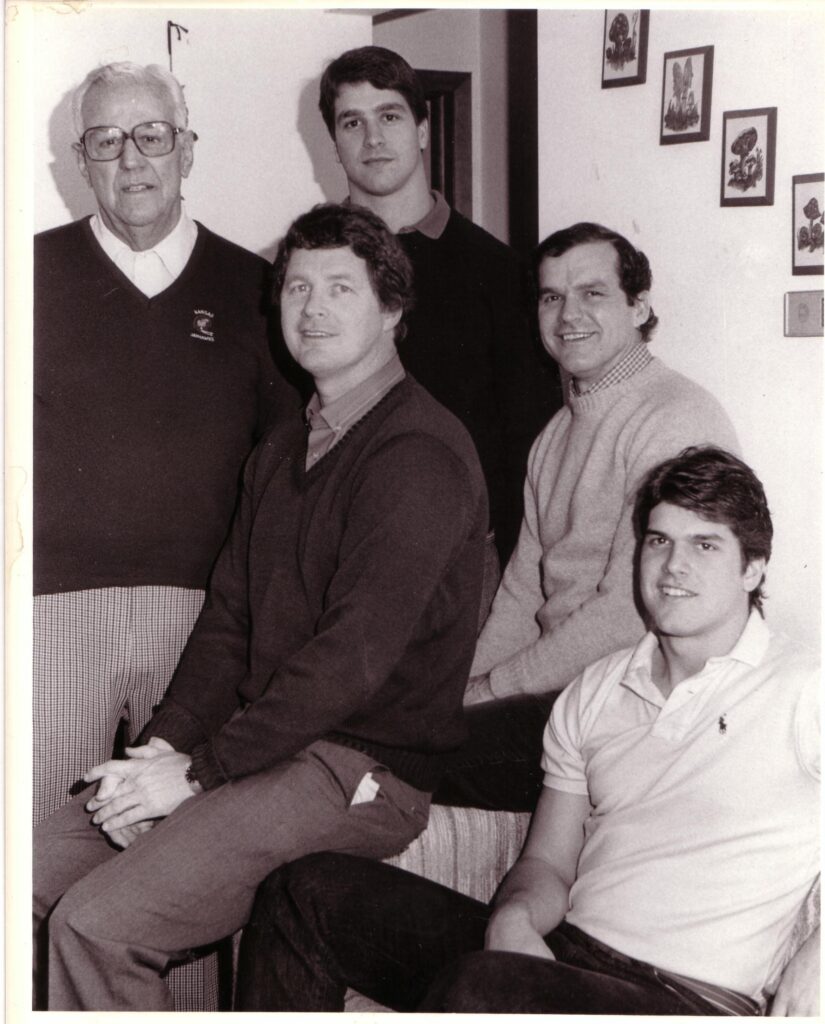
Soon, the Gottfrieds were forced to relocate, and Mike’s mother sent him to live with distant family, the patriarch of which was a serious man named Bill Harbaugh. Young Mike viewed the elder Bill as a strict disciplinarian, and Bill didn’t disappoint. “Mike, eat everything on the plate,” Harbaugh instructed at the dinner table. “And you’ll drink no liquids.” (According to Mike, Harbaughology taught that drinking liquids during a meal might stunt the growth of a young athlete, who needed to pack in as much food as possible.)
However unorthodox the method, Mike insists that his six months at the Harbaughs was precisely what he needed.
Instilling further discipline in Mike’s life was a local nun, who intimated to the moving-wayward boy that his ship was getting off course. She shared with him the famous verse from the Book of Jeremiah, one that Mike now says is something you hold onto when things are looking bleak.
After graduation from Morehead State University, Mike coached high school at Roseville High School and later St. Paul High School, accumulating a 50-19-1 record across five seasons.
In 1975, he was hired as the associate head coach at the University of Cincinnati under Tony Mason. It was during this time that the “Big Red Machine” was blistering its way to a World Series championship with the likes of Pete Rose, Tony Perez, Johnny Bench, and Joe Morgan. While in Cincy, Gottfried met Rose and the two hit it off immediately. Since then, the pair has maintained a forty-year friendship.
After a short stint at the University of Arizona, Mike got his first head coaching job at Murray State University in Kentucky. He spent three seasons with the Racers before taking the head coaching position at Cincinnati in 1981.
Gottfried later coached at Kansas for three seasons (’83-’85) and the University of Pittsburgh for four seasons (’86-’89).
And because most young people remember Mike Gottfried for his stint with ESPN as a broadcaster for college football games, many have forgotten how successful he was as a football coach. During his tenures at Kansas and Pitt, Mike defeated teams led by Barry Switzer, Lou Holtz, and Joe Paterno. Many of Mike’s assistants went on to have successful careers in their own right, including John Fox, Mike McCarthy, Ron Zook, Frank Beamer, John Harbaugh, Paul Hackett, and Mike Solari. In addition, thirty-five of Mike’s former players moved on to the NFL, including Craig “Iron Head” Heyward. Gottfried also had the opportunity to work alongside several coaching greats, including John Calipari, assistant coach at Kansas (’82-’85) and Pitt (’85-’88), and Larry Brown, head coach at Kansas from 1983-88.
Though at the time Mike’s only experience in front of a TV was his regular appearance on The Mike Gottfried Show while at Pitt, ESPN needed a game analyst and soon came a-calling. Mike signed a five-game contract, but quietly planned to get back into coaching after the 1990 season. Because Mike’s new job with ESPN allowed him considerable flexibility, he chose to move his family to Mobile. Mike continued with ESPN throughout the 1990s and became part of one of the most beloved college football announcing duos alongside his partner, Ron Franklin.
That career eventually came to an end, but Mike discovered his calling was much broader than college football announcing. In 2000, Mike’s wife Mickey suggested they take a few underprivileged boys in the Mobile area out to eat.
“No,” Mike said initially. “I want to spend time with my own children.”
But Mickey was unrelenting. Soon Mike realized that this could be the beginning of a ministry—something that could be truly extraordinary and have a lasting impact on hurting young men in this coastal Alabama city. Besides, Mike needed something to reinvigorate his zest for life. He had grown restless. He admitted he felt “put out to pasture.”
Enter Team Focus.

Mike and Mickey eventually did pick up a few boys—sixty of them, to be exact—by inviting them to a camp called “Camp Focus” funded by proceeds from the GMAC Bowl. Campers were taught how to say, “yes ma’am” and “no ma’am,” to balance a checkbook, to tie a tie, to eat at a nice restaurant, and to ask a girl out on a date. Fishing hooks were plunged into ponds and prayers were said over these young men—things that, Mike believes, fathers should be teaching their children.
As the program progressed, Mike and others surmised that it was possible, not to replace, but to “fill the gap” left by a father’s absence or indifference. Mike also hoped that a sense of manhood might grow out of this brokenness.
“True manhood is serving people, honoring people, and loving people,” Mike says. “Being a good Christian, following the Bible, and walking in the destiny that God gave you.”
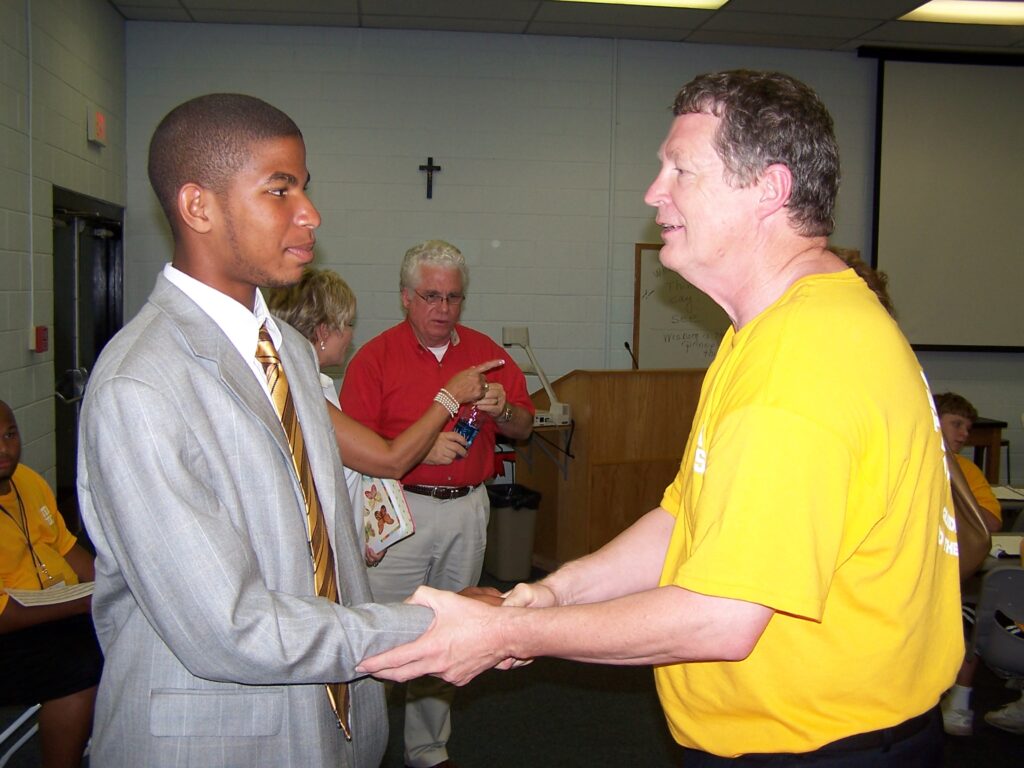
God took Mike out of the coaching arena, molded and prepared him through broadcasting, and slowly unfurled His mysterious, divine plan for his life over a number of wilderness years. Then He affirmed Mike by giving him a much bigger arena, one whose rim does not encompass the mere length and breadth of a football field, but rather one that circumnavigates the country. Team Focus now serves over 1,000 at-risk youth from satellite offices in Austin, Mobile, Jacksonville, Las Vegas, Lexington, South Florida, and Ohio.
“Since 2000, Team Focus has served over 4,000 young men without father,” Mickey says. “They are at-risk because they do not have a father, but not ‘at-risk’ in every sense of the word. We accept young men without fathers and raise up leaders.”
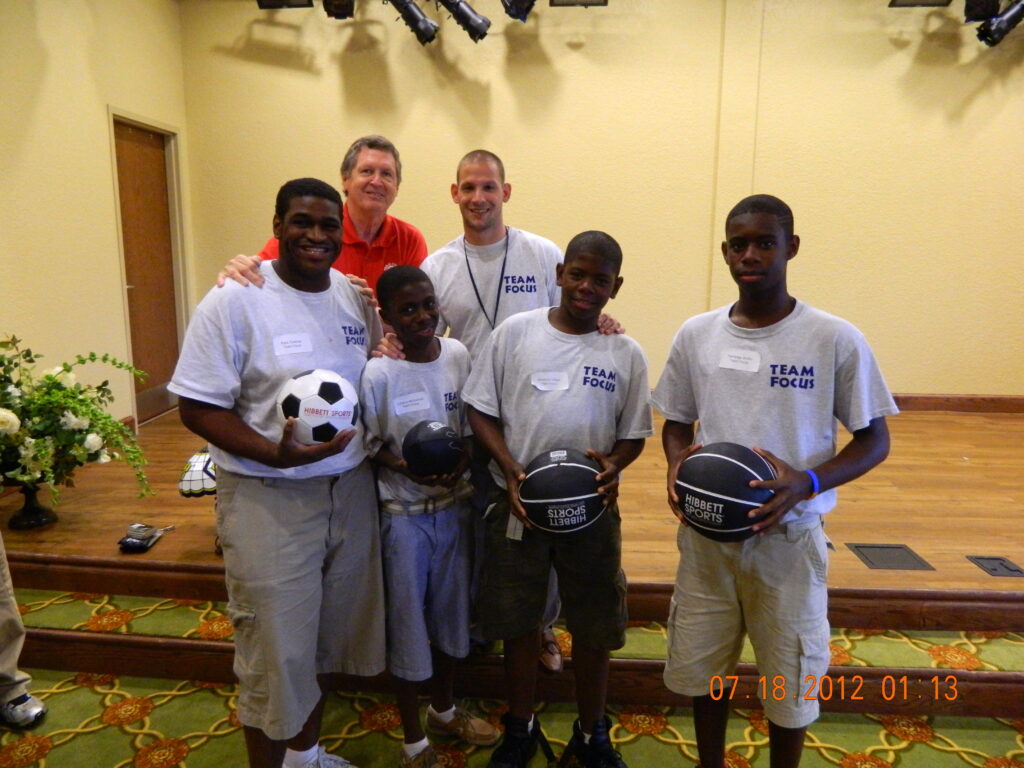
Empathizing with these young men who have a hole the size of a father’s love in their heart, Mike literally pours his life into each one of their lives. He knows their names; they have his cell phone.
Through this ministry, God gave Mike the desires of his heart. It just took him a long time to understand what those desires were. Those thousand boys might not have a father, but to them, Mike Gottfried is the next best thing.
There’s an old saying that goes, “It is doubtful whether God can use a man greatly until first He wounds him deeply.”
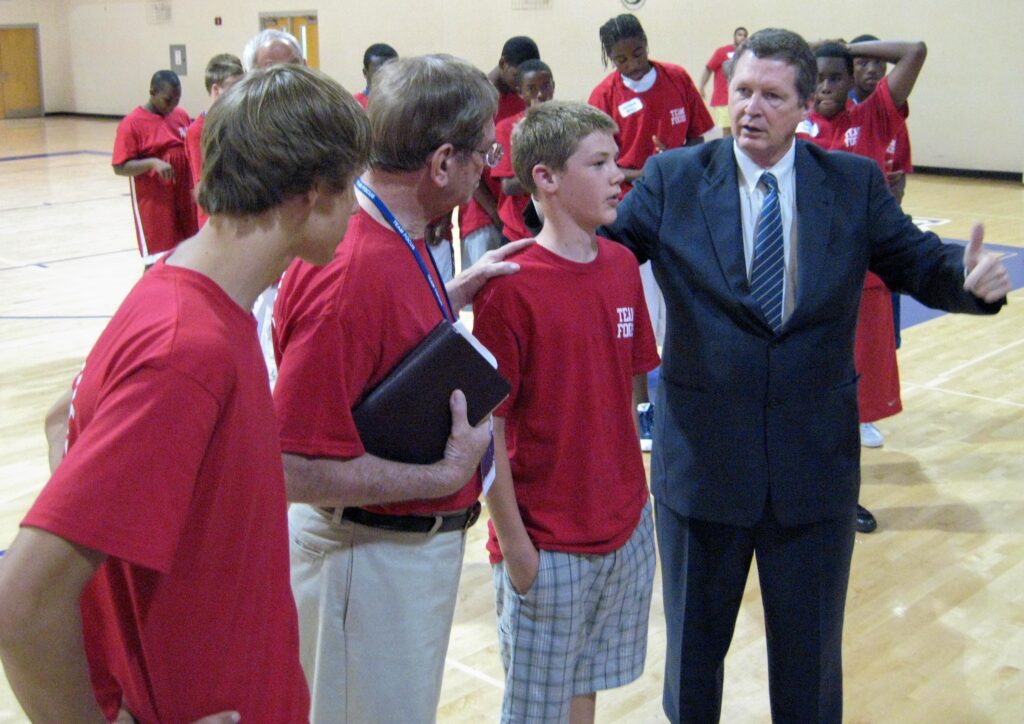
Perhaps the answer to “Why Now?” is that Mike understands perfectly how an eleven-year-old feels without a father. Perhaps Mike knows best the patina of ache from a fatherless household.
“I still mourn for my father,” Mike says. “But I think I’ve healed.”
Through it all, Mike Gottfried has learned the biggest lesson about healing:
Love is the best remedy for wounds. 413





